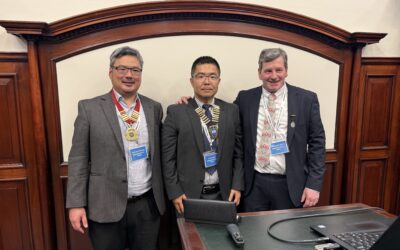The branch opened its 2019-2020 session on 27 August with two linked events on MIC – Microbiologically Induced Corrosion. The well-attended Annual Corrosion Awareness Day (CAD) had a full day teaching programme on MIC risks, mitigations, modelling and bacterial analysis, complimented by an evening visit the following week, to NCIMB Laboratories in Bucksburn and the National Collection of Industrial, Food and Marine Bacteria.
The CAD event featured some excellent talks by Dr Carol Devine (ICR), Drs Laura Tiano and Lone Tang (Danish Technological Institute), Mabel Ntim (Shell), and Drs Ian Laing, Daniel Sandana and Mr Steven Loftus (CAD Co-ordinator), from key Sponsor ROSEN.
Microbiologically influenced corrosion can have a major impact on operators’ CAPEX and OPEX and cause severe environmental damage. A key aim of the CAD workshop was therefore to improve understanding of complex MIC processes, detection of microbiological activity in pipeline systems and management of MIC in the pipeline industry in particular, which has seen many pipelines lost due to internal corrosion in the North Sea sector.
Many analytical techniques were discussed in detail, including qPCR analysis (amplification and quantification of bacterial DNA), traditional culture-based MPN (most probable number), NGS, (next-generation sequencing which has revolutionised biological sciences), Metagenomics (the study of genetic material recovered directly from environmental samples), along with pipeline in-line inspection tools, (deploying a wide range of NDT methods), internal cleaning, chemical treatment and MIC modelling tools for corrosion rate determination.
A lively discussion followed with many valuable viewpoints expressed and with great inputs from the four participating Microbiologists.
The need for an integrated approach to microbial monitoring combining data from multiple techniques, together with taking a fully holistic approach to pipeline integrity management was emphasized to all CAD delegates.
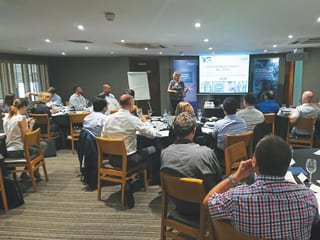
Dr Carol Devine opened the Teaching Programme with a fascinating insight into her career as a Microbiologist entitled “My Life in MIC”.
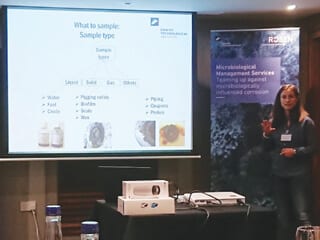
Dr Laura Tiano (Danish Technological Institute) discusses bacterial sampling options.
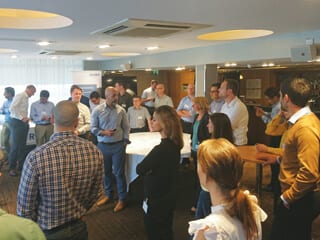
Dr Ian Laing, Principal Corrosion Engineer of ROSEN discussed MIC modelling / MIC management, and the vast range of specialist tools available for cleaning and intelligent pigging.
The NCIMB visit on 3rd September built on the previous discussions, with a most informative evening led by Dr Daniel Swan, who was previously Head of Platforms and Pipelines, (now the Genomics Pipelines Group) at the Earlham Institute in Norwich, (formerly The Genome Analysis Centre – TGAC).
NCIMB have 68 years’ experience of preserving, storing, distributing, analysing and exploiting micro-organisms, and are the only privately owned, publicly viewable collection of bacteria in the UK.
A very comprehensive tour of the NCIMB Laboratories followed Daniel’s presentation and recommendations for effective bacterial monitoring strategies, with everyone kitted out in protective clothing to view a wide range of practical demonstrations of bacterial sampling. archiving
and determination.
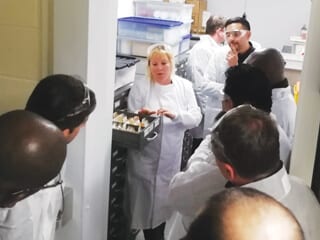
A peek inside the National Collection of Industrial Food and Marine Bacteria vault: with Samantha Law (Culture Collection Curator).
This most interesting industrial visit to NCIMB, (the first of two in the 2019-2020 programme), generated many questions, so many in fact the event overran by nearly 90 minutes!
At the close of both meetings, the new Aberdeen Chair, Mr Stephen Tate presented all speakers and organisers with Certificates of Appreciation.
Full details of future Aberdeen events can be found on the diary page of the magazine and on the website, or by contacting: ICorrABZ@gmail.com, and all past branch presentations can be found on: https://sites.google.com/site/icorrabz/resource-center



